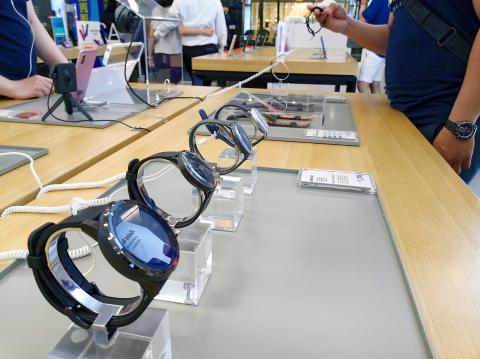Standards for wearable devices that monitor body functions should be established, as their effectiveness and features, as well as the reliability of their data, are questionable, Linkou Chang Gung Memorial Hospital cardiologist Chang Po-cheng (張伯丞) said.
Wearable health monitoring devices such as fitness wristbands and sports watches are being introduced, with many touting features such as heart rate monitors, pedometers and milometers, as well as functions to estimate calories burned and track sleep.
However, physiological data from such devices seem questionable and should be used for reference only, Chang said.

Photo: Wu Liang-yi, Taipei Times
Proper medical treatment still requires hospital equipment, said Chang, who led a team who developed a wearable device that monitors the heart.
Most of the consumer wearable health devices in stores produce data that are easily affected by noise, Chang said.
Signal stability is the most important factor and the devices work best when stuck to the skin, so smart health wristbands or watches that are not in constant contact with the skin due to the wearer’s activities lack signal stability, he said.
However, consumer devices can still be helpful. For example, heart rate monitoring can alert the wearer to early signs of cardiac arrhythmia, or irregular heartbeat, and prompt them to seek medical attention, he said.
Taipei Medical University College of Medical Science and Technology dean Jack Li (李友專) said that wearable devices that promote themselves as health monitors should have features that are superior to other wearable consumer devices.
The government should establish quality examination and verification standards for such devices, so that doctors and the general public could trust the data, he said.
According to the Ministry of Economic Affairs’ Bureau of Standards, Metrology and Inspection, only wearable GPS devices need to pass accuracy requirements, while non-GPS wearable devices are only tested for battery capacity and safety.
The Food and Drug Administration said it has spent about NT$800,000 to establish examination criteria for wearable health monitoring devices, including for data stability while monitoring static and dynamic heart rates, blood oxygen levels and others.

The manufacture of the remaining 28 M1A2T Abrams tanks Taiwan purchased from the US has recently been completed, and they are expected to be delivered within the next one to two months, a source said yesterday. The Ministry of National Defense is arranging cargo ships to transport the tanks to Taiwan as soon as possible, said the source, who is familiar with the matter. The estimated arrival time ranges from late this month to early next month, the source said. The 28 Abrams tanks make up the third and final batch of a total of 108 tanks, valued at about NT$40.5 billion

A group from the Taiwanese Designers in Australia association yesterday represented Taiwan at the Midsumma Pride March in Melbourne. The march, held in the St. Kilda suburb, is the city’s largest LGBTQIA+ parade and the flagship event of the annual Midsumma Festival. It attracted more than 45,000 spectators who supported the 400 groups and 10,000 marchers that participated this year, the association said. Taiwanese Designers said they organized a team to march for Taiwan this year, joining politicians, government agencies, professionals and community organizations in showing support for LGBTQIA+ people and diverse communities. As the first country in Asia to legalize same-sex

MOTIVES QUESTIONED The PLA considers Xi’s policies toward Taiwan to be driven by personal considerations rather than military assessment, the Epoch Times reports Chinese President Xi Jinping’s (習近平) latest purge of the Chinese People’s Liberation Army (PLA) leadership might have been prompted by the military’s opposition to plans of invading Taiwan, the Epoch Times said. The Chinese military opposes waging war against Taiwan by a large consensus, putting it at odds with Xi’s vision, the Falun Gong-affiliated daily said in a report on Thursday, citing anonymous sources with insight into the PLA’s inner workings. The opposition is not the opinion of a few generals, but a widely shared view among the PLA cadre, the Epoch Times cited them as saying. “Chinese forces know full well that

Travel agencies in Taiwan are working to secure alternative flights for travelers bound for New Zealand for the Lunar New Year holiday, as Air New Zealand workers are set to strike next week. The airline said that it has confirmed that the planned industrial action by its international wide-body cabin crew would go ahead on Thursday and Friday next week. While the Auckland-based carrier pledged to take reasonable measures to mitigate the impact of the workers’ strike, an Air New Zealand flight arriving at Taipei from Auckland on Thursday and another flight departing from Taipei for Auckland on Saturday would have to